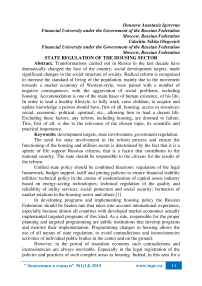State regulation of the housing sector
Автор: Dunaeva Anastasia Igorevna, Udachin Nikita Olegovich
Журнал: Экономика и социум @ekonomika-socium
Статья в выпуске: 1-2 (14), 2015 года.
Бесплатный доступ
Transformations carried out in Russia in the last decade have dramatically changed the face of the country, social development targets, made significant changes in the social structure of society. Radical reform is recognized to increase the standard of living of the population, mainly due to the movement towards a market economy of Western-style, were paired with a number of negative consequences, with the aggravation of social problems, including housing. Accommodation is one of the main bases of human existence, of his life. In order to lead a healthy lifestyle, to fully work, raise children, to acquire and update knowledge a person should have, first of all, housing, access to resources: social, economic, political, spiritual, etc., allowing him to lead a decent life. Excluding these factors, any reform, including housing, are doomed to failure. This, first of all, is due to the relevance of the chosen topic, its scientific and practical importance.
Development targets, state involvement, government regulation
Короткий адрес: https://sciup.org/140124535
IDR: 140124535
Текст научной статьи State regulation of the housing sector
The need for state involvement in the reform process and ensure the functioning of the housing and utilities sector is determined by the fact that it is a sphere of life support Russian citizens, that is a factor that contributes to the national security. The state should be responsible to the citizens for the results of the reform.
Unified state policy should be combined functions: regulation of the legal framework; budget support, tariff and pricing policies to ensure financial stability utilities; technical policy in the course of modernization of capital assets industry based on energy-saving technologies; technical regulation of the quality and reliability of utility services; social protection and social security; formation of market relations in the housing sector and others.[1]
In developing programs and implementing housing policy the Russian Federation should be beaten rate that takes into account international experience, especially because almost all countries with developed market economies actually implemented targeted programs of this kind. As a rule, responsible for the proper planning and targeted programming are public institutions that develop programs and monitor their implementation. Programming changes in housing allows the use of all means of state regulation, to avoid contradictions and inconsistencies activities of individual public bodies in the center and on the ground.
However, in the period of transition economy such contradictions and inconsistencies are always inevitable. Especially in the legal registration of the policies and practices of such complex areas as housing. Indeed, in this area for a short time had often without any legal precedent in domestic practice to create about a hundred acts and regulatory requirements relating to the behavior of many thousands of positions a variety of legal subjects in different directions of their activity: housing and housing and communal services; land use and urban management; housing finance system and infrastructure of the housing market, and so on. d. For each of these areas have been developed and adopted laws that are separate rules that take into account market developments in the housing sector.[2]
The functions of local government in the implementation of housing policies are disclosed in connection with the implementation of the state program "Housing", which provides the structural changes in the management and maintenance of housing. The main thing here is to transfer to local authorities of the State, including ownership of the housing facilities.
Most of the issues of housing relations, formerly under the jurisdiction of the state, with the beginning of market reforms were transferred to the regions and local authorities, but the imperfection of the legal field of the latter has a negative impact on housing policy implementation and therefore needs further law-making for its removal.[3]
Adoption of the law of the Russian Federation "On privatization of housing stock in the Russian Federation" was the beginning of housing reform in the country. The most important directions in the field of housing reform in Russia were determined by decrees of the President of the Russian Federation, the Government of the Russian Federation. In the decade were created by legal and organizational framework of housing policy, identified priority areas, developed mechanisms for its implementation.
In the center of the state social policy in the sphere of housing is a person interacting with the market environment for the organization of their livelihoods. The housing sector is an important sector of the economy, which affects the overall economic well-being of the country.
The success of the reform of the housing sector depends on the ratio of the population to him, first of all, the recognition of consumers of services that the objectives and goals of the reform of their own interests. The active involvement of the public to meet the challenges of housing sector by encouraging selforganization of associations of tenants, homeowners associations, territorial communities residents, tenants create favorable conditions for their choice of public services in the districts and cities, effective control over the work of the past, extensive development of housing movement, etc. . d. create the necessary public support objectively urgent reforms in the housing sector, which will ensure the success of this complex, one of the key Russian market reforms of the case.
Список литературы State regulation of the housing sector
- Tihonova N.E., Akatnova A.M., Sedova N.N. Zhilishhnaja obespechennost' i zhili shhnaja politika v sovremennoj Rossii//Socis. -№1.-2013.
- Bushev A.Ju., Gorodov O.A., Gubaeva A.K. Kommentarij k Zhilishhnomu kodeksu Rossijskoj Federacii (postatejnyj). -2-e izd., pererab. i dop. -M.: Prospekt, 2012.
- Butova T.V. Interaction of civil society with government authorities. Bulletin of the University (State University of Management). 2013. №3. S. 119 -128.
- Alekseev A.A. Mehanizm realizacii zhilishhnoj politiki krupnogo goroda (na primere g. Moskvy): pererab. i dop. -M.: Mashinostroenie, 2014.


